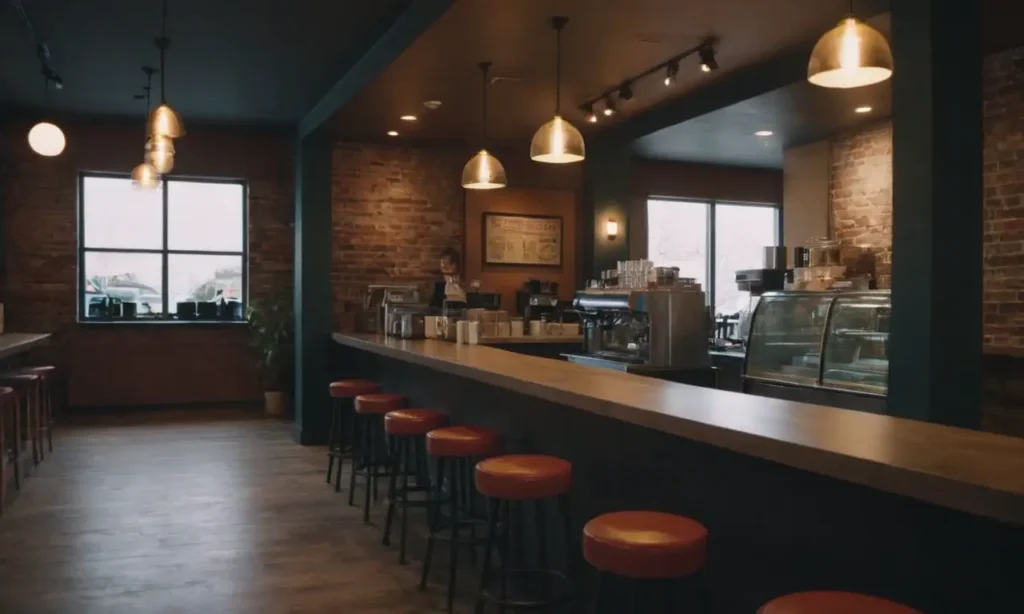As the owner of the famous Regency Café, I think I can guide you like nobody else in the UK.
Opening a coffee shop is an exciting venture — the smell of freshly brewed coffee, the hum of chatter, and the satisfaction of running your own little corner of the caffeine universe.
But let’s be honest, it’s not all latte art and cozy vibes. Starting a coffee shop in the UK requires planning, hard work, and a sprinkle of humour to keep you sane.
So, if you’re ready to take the plunge, here’s a detailed, step-by-step guide to help you turn your dream into a steaming-hot reality.

Step 1: Research the Coffee Scene
Know Your Beans: Before you dive into finding a location or buying an espresso machine that costs as much as a used car, take some time to research. Visit local coffee shops, observe their offerings, and identify what’s missing in your area. Are people craving oat-milk flat whites or good old-fashioned filter coffee?
Check the Competition:
| Key Questions to Ask | Why It Matters |
|---|---|
| Who are your competitors? | To understand what works and what doesn’t. |
| What do they charge? | To price your menu competitively. |
| What’s their vibe? | To create a unique selling point (USP). |
Step 2: Develop a Solid Business Plan
Yes, it’s tempting to wing it, but a business plan is like a recipe for success (pun intended). Include the following:
- Mission Statement: Why does your coffee shop exist? (Besides your love of caffeine.)
- Target Audience: Who are you serving? Students, professionals, dog-walkers?
- Financial Plan: How much money do you need, and where will it come from?
- Marketing Plan: How will you get customers through the door?
A well-thought-out business plan will also help you secure funding, whether it’s from a bank or that one friend who thinks your flat whites will be life-changing.

Step 3: Secure Funding
Coffee shops aren’t cheap to set up. Here’s a quick breakdown of potential costs:
| Expense | Estimated Cost Range |
| Equipment (espresso machine, grinder) | £5,000 – £15,000 |
| Rent and Utilities | £5,000 – £10,000/month |
| Furniture and Decor | £2,000 – £5,000 |
| Licenses and Permits | £500 – £2,000 |
| Stock (coffee beans, milk) | £1,000 – £3,000 |
Options for funding:
- Personal Savings
- Bank Loan
- Crowdfunding (Perfect for those with a loyal social media following.)
- Investor (Your rich uncle, perhaps?)
Step 4: Choose the Right Location
They say location is everything, and they’re right (whoever “they” are). Here’s what to consider:
- Foot Traffic: A coffee shop on a busy high street beats one tucked in an alley.
- Accessibility: Ensure your space is easy to find and has parking nearby.
- Rent: Find a balance between location quality and affordability. A corner in Soho might be dreamy, but your wallet might wake up screaming.
Step 5: Get the Legal Stuff Sorted
Nobody likes paperwork, but here’s what you’ll need:
- Register Your Business: Choose a business structure (sole trader, partnership, or limited company) and register with HMRC.
- Food Hygiene Certificate: Your staff will need this.
- Licenses:
- Premises License (if you plan to serve alcohol).
- Music License (because silence and coffee don’t mix).
- Insurance: Public liability, employer’s liability, and business insurance.
Step 6: Design Your Space
Here’s your chance to create a vibe that’s Instagram-worthy. Consider:
- Seating Layout: Comfortable, functional, and accommodating for both solo laptop warriors and chattering groups.
- Decor: Industrial chic? Rustic farmhouse? Minimalist? Choose a style that resonates with your brand.
- Lighting: Natural light is a winner, but warm, ambient lighting works wonders in the UK’s gloomier months.
Step 7: Invest in Quality Equipment
Your coffee equipment is the heart of your business. Here’s the must-have list:
- Espresso Machine (a workhorse, not a diva).
- Coffee Grinder (grinding fresh is non-negotiable).
- Brewing Tools (French press, pour-over kits).
- POS System (to keep track of sales and avoid sticky notes on the till).
Step 8: Build Your Menu
Think beyond coffee. Include teas, juices, and snacks. Offer options for dietary preferences (vegan, gluten-free). Here’s a tip: A small, curated menu is better than trying to please everyone. Remember, you’re not running a diner.

Step 9: Market Like a Pro
Even the best coffee shop won’t succeed if no one knows about it. Strategies include:
- Social Media: Post drool-worthy shots of your coffee and space.
- Local Advertising: Flyers, partnerships with nearby businesses.
- Loyalty Program: Encourage repeat visits with rewards.
- Grand Opening: Host an event with freebies and discounts to attract attention.
Step 10: Prepare for the Grind (Pun Intended)
Running a coffee shop is hard work. Long hours, grumpy customers, and the occasional milk shortage are all part of the deal. But with passion and persistence, you’ll find your rhythm.
Pro Tip: Keep your sense of humour handy. It’ll come in clutch when someone orders a “decaf soy vanilla no-foam latte” and then asks, “What’s taking so long?”
Legal and Technical Aspects
Guide to help you cover all the necessary legal and technical aspects.
Legal Requirements
Choose a Business Structure
- Sole Trader: Simple setup, full control, but personal liability.
- Partnership: Shared responsibility, more capital, but shared liability.
- Limited Company: Limited liability, easier to raise capital, but more regulatory requirements.
Register Your Business
- HM Revenue and Customs (HMRC): Register your business for tax purposes.
- Companies House: If forming a limited company, you must register here.
Obtain Necessary Licenses and Permits
- Business License: Register with your local authority.
- Food Hygiene Certificate: All food handlers must complete food safety training.
- Health and Safety Compliance: Ensure you meet the health and safety standards.
- Alcohol License: If you plan to serve alcohol, apply for a premises license and personal license.
- Music License: Obtain licenses from PPL PRS Ltd if you plan to play music.
Compliance with Employment Laws
Right to Work Checks: Ensure all employees have the legal right to work in the UK.
Employment Contracts: Provide written statements of employment particulars.
National Minimum Wage: Pay employees at least the national minimum wage or living wage.
Employee Insurance: Obtain employers’ liability insurance.

Technical Requirements
Location and Premises
- Lease Agreement: Secure a lease for your premises. Ensure the location is zoned for commercial use.
- Building Regulations: Comply with building regulations for any structural changes.
- Planning Permission: Obtain planning permission for change of use if needed.
Health and Safety Regulations
- Risk Assessment: Conduct a risk assessment and implement necessary safety measures.
- Fire Safety: Install fire alarms, extinguishers, and ensure clear evacuation routes.
- Food Safety Management: Implement a food safety management system based on HACCP principles.
Waste Management
- Waste Disposal: Arrange for proper disposal of commercial waste, including recycling.
- Environmental Health: Comply with local environmental health regulations.
Equipment and Supplies
- Coffee Machines and Grinders: Invest in high-quality equipment.
- Refrigeration: Ensure proper storage for perishable items.
- Furniture: Comfortable and durable seating and tables.
Technology and POS Systems
- Point of Sale (POS) System: Invest in a reliable POS system for transactions and inventory management.
- Wi-Fi: Provide free Wi-Fi for customers.
- Security Systems: Install CCTV and alarm systems for security.
Insurance
- Public Liability Insurance: Covers legal costs if someone is injured on your premises.
- Product Liability Insurance: Covers costs if someone gets sick from your food or drinks.
- Building and Contents Insurance: Protects against damage to your property and equipment.
- Employer’s Liability Insurance: Mandatory if you have employees.
Summary Table
| Legal Aspect | Details |
|---|---|
| Business Structure | Sole Trader, Partnership, Limited Company |
| Business Registration | HMRC, Companies House (for limited companies) |
| Licenses and Permits | Business License, Food Hygiene, Alcohol License, Music License |
| Employment Laws | Right to Work, Employment Contracts, Minimum Wage, Employer Insurance |
| Technical Aspect | Details |
|---|---|
| Location and Premises | Lease Agreement, Building Regulations, Planning Permission |
| Health and Safety | Risk Assessment, Fire Safety, Food Safety Management |
| Waste Management | Waste Disposal, Environmental Health |
| Equipment and Supplies | Coffee Machines, Refrigeration, Furniture |
| Technology and POS | POS System, Wi-Fi, Security Systems |
| Insurance | Public Liability, Product Liability, Building and Contents, Employer’s Liability |
Following these steps will help ensure that you meet all legal and technical requirements to open your coffee shop in the UK.
Conclusion
Opening a coffee shop in the UK is no walk in the park, but it’s a rewarding journey. With the right planning, a killer cup of coffee, you can create a thriving business that’s as satisfying as a perfectly pulled espresso shot. Now, go forth and caffeinate the nation!




